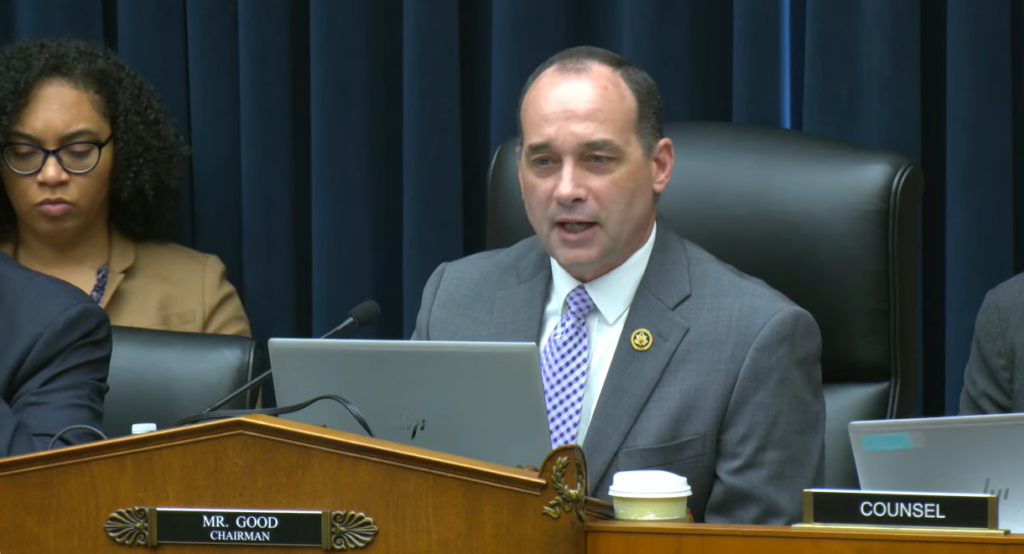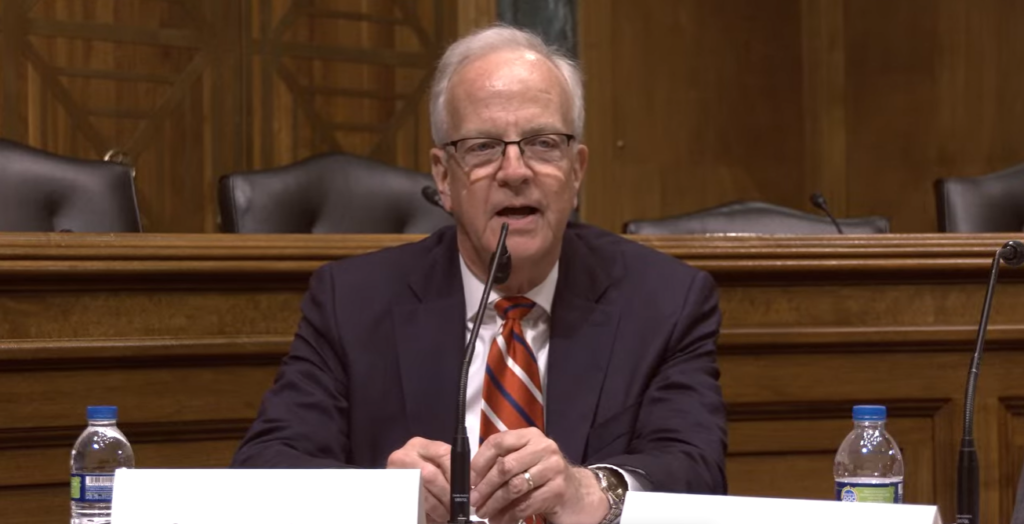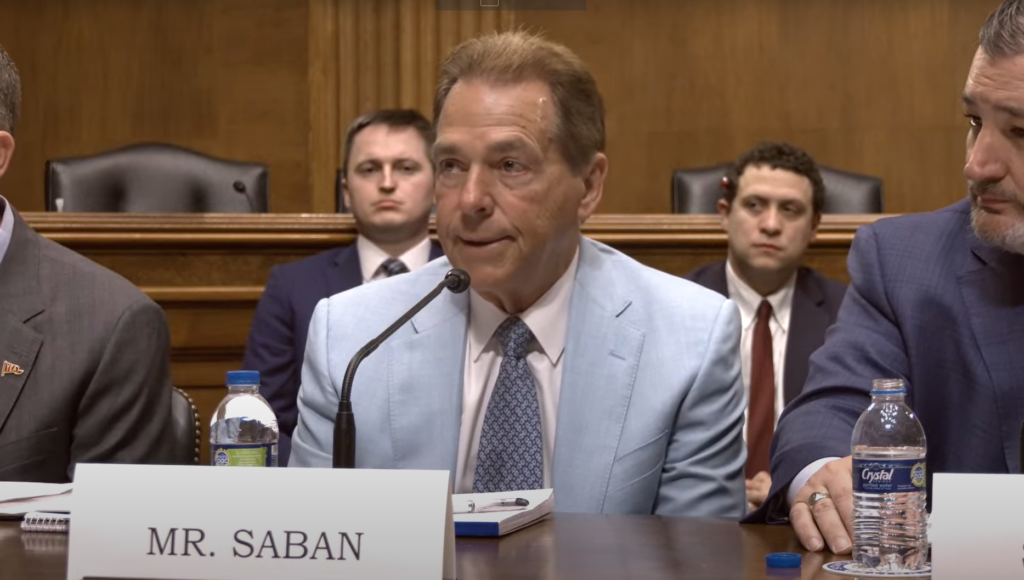Latest news, analysis from NLRB legislative hearing, Sen. Ted Cruz's NIL roundtable

As conferences squabble over the future of the College Football Playoff model and revenue-sharing distribution and championship week arrives in college basketball, the NCAA was on Capitol Hill again.
Tuesday was an action-packed day in Washington, D.C., set against a turbulent background in college sports. The Dartmouth men’s basketball team voted to form a union last week, becoming the first unionized college athletes. Legal pressures continue to mount against the NCAA, which currently faces preliminary injunctions in lawsuits involving NIL and the transfer portal.
The Big Ten and SEC have never been more powerful, with a combined 34 teams entering the 2024 college football season thanks to conference realignment. Commissioners Greg Sankey and Tony Petitti have come together to form a joint advisory group and control a significant amount of power in CFP meetings.
“Let’s not be shy,” Wasserman CEO Casey Wasserman recently said on The Bill Simmons Podcast. “The Big Ten and the SEC look a whole lot like the AFC and the NFC, and that’s not an accident.”
NCAA President Charlie Baker has not found any success lobbying Congress over the past year. Among the NCAA’s top wishes in a federal NIL mandate include an antitrust exemption, preemption over state NIL laws and codifying athletes are not employees.
Sources have indicated to On3 that recently there is an appetite in the Senate for a narrow piece of legislation that could start revenue-sharing between institutions and athletes while ensuring players are not employees.
Tuesday was a test balloon to see how serious these discussions are, specifically with U.S. Senator Ted Cruz‘s roundtable. The House Education & The Workforce Committee’s legislative hearing was focused on the recent NLRB regional decision to certify Dartmouth athletes as employees.
On3 had every angle of the events covered in this live blog recap, with multiple reporters analyzing the event.
‘Let’s not destroy our athletic programs’
1 p.m. ET – Wrapping up the House Education & The Workforce Committee’s legislative hearing, Rep. Burgess Owens sums up the current state of affairs in college sports in two words: “Pure chaos.”
“This is a way to truly destroy an industry,” Owens said of the potential employee model. “Let’s not destroy our athletic programs.”
You can watch the hearing at this link.

What’s the cost to employ all athletes?
12:45 p.m. ET – During the House Education & The Workforce Committee’s legislative hearing, Rep. Bob Good said he had a hard time understanding why college student-athletes should be deemed as employees.
“They’re willing participants,” Good said. “They’re the envy of their campus. They’re the envy of their high school teammates who didn’t have the ability to continue in college. That is the reality of the student-athletes that we’re talking about on typical college campuses.”
After asking Saint Joe’s athletic director Jill Bodensteiner about how much she estimated it would cost to make all athletes employees, Good broke down his own estimates.
“Let’s say you have 500 athletes,” he said. “You’re going to pay them $20 an hour. I know they would negotiate if Mr. Pearce and others had their way for $20 an hour. Let’s just say it’s $20 an hour for 20 hours a week. And they do not work more than 20 hours a week. That’s just a misrepresentation, also by the way.
“Let’s say you have to pay them $400 a week times 500 student-athletes that’s $200,000 a week. If you annualize that – I realize they’re not the full 20 hours a week during the so-called offseason – that’s some $10 million a year for the typical D-I institution. What would happen to women’s sports? … But even beyond women’s sports, men’s Olympic sports would be most impacted. We might decide we don’t want golf. We don’t want track. We don’t want wrestling. We don’t want these other sports that don’t have Title IX protection.”
Control issue still not addressed
12:30 p.m. ET – During the House Education & The Workforce Committee’s legislative hearing, nobody has yet to ask Saint Joe’s athletic director Jill Bodensteiner if she, coaches and college athletic leaders are willing and able to relinquish some control over athletes in order to avoid an employee model coming to your campus?
Control is the central issue at play.
Roundtable concludes: What’s next?
11:45 a.m. ET – Senator Ted Cruz’s roundtable has ended. There’s real momentum behind revenue sharing. There was also some consensus that athletes shouldn’t be classified as employees.
Where does the Senate take things from here?
You can watch the roundtable at this link.

USC athletes spend 40-60 hours a week on sports
11:30 a.m. ET – Rep. Mark Takano asks Mark Gaston Pearce of the Workers’ Rights Institute at Georgetown Law and a former NLRB chair, about excessive hours for athletes. Pearce cites USC athletes referencing 40-60 hours per week spent on sports. Pearce said a collective bargaining agreement would address excessive hours on sports.
Plus, Pearce said the Supreme Court has spoken about the control the NCAA has over schools/athletes.
“The question of the joint employer relationship is very real,” Pearce said, which opens the door for public school athletes to be deemed employees.

‘This is the moment to strike’ on NIL bill
11:25 a.m. ET – Alabama athletic director Greg Byrne and Senator Jerry Moran both spoke candidly Tuesday that there is plenty of commonality between all parties.
“I think we have a lot more in common on things that we want to do and figure out here because we all very much care about the enterprise and college sports,” Byrne said.
Moran agreed.
“I loved hearing that there was a lot of commonality here,” Moran said. “I think that’s true. In four years of trying to figure out legislative effort, we’re this close. And if you all can help us – everyone tell us what they can give and what they can take – to get us that much closer. I think a bill is doable. The evidence is there that it’s more needed. And the desire with Republican and Democrat members of the Commerce Committee but as the Senate as a whole is evident.
“My message now is that maybe it didn’t take four years, eight years and it took something longer, but this is the moment to strike. Please help us close that gap and get this done.”
Nick Saban’s thoughts on revenue sharing
11:15 a.m. ET – The Alabama head coach is for name, image and likeness opportunities to continue to exist combined with revenue sharing.
“They still have name, image and likeness opportunities,” Nick Saban said. “They can still do name, image and likeness. They still have those opportunities. But it’s not going to be created. It’s going to be something that they all earned.
“In other words, I’m not really for collectives. I respect what these folks over here do. But I think those funds should go to the institution. Not to create opportunities.”
Saban for revenue sharing, against employment
11:05 a.m. ET – Alabama head coach Nick Saban is for players receiving a piece of revenue but does not want college athletes classified as employees.
“I think the system that we have in the NFL, where players are employees would be better than the system that we have now because at least it creates parity,” Saban said.
Top 10
- 1New
Shilo Sanders
Lands with NFL team
- 2
Picks by Conference
The final tally in NFL Draft
- 3Trending
Mel Kiper
Eviscerates NFL: 'Clueless'
- 4
D.J. Uiagalelei
Signs NFL free agent deal
- 5Hot
Quinn Ewers drafted
Texas QB off the board
Get the On3 Top 10 to your inbox every morning
By clicking "Subscribe to Newsletter", I agree to On3's Privacy Notice, Terms, and use of my personal information described therein.
‘What’s important in higher education?’
11 a.m. ET – ACC commissioner Jim Phillips was honest about where the funding of college sports comes from: football and men’s basketball.
“The funding of a department for 22 sports, 28 sports comes from two sports,” he said. “In generalities, 85% comes from the sport of football and nearly 15% comes from men’s basketball. We can pay those athletes. Certainly, we can pay those athletes. And then we can pay from a Title IX standpoint the equivalent number of female athletes. So, 185, 15, 100 or whatever number you want on the men’s side. And then you can go from about 28 points to about six sports in the matter of one fiscal year. I don’t know what’s important.
“What’s important in higher education? I think it’s access and affordability to higher education and that’s what we’re able to do.”
Advocate says athletes ‘need seat at table’
10:51 a.m. ET – In the House hearing, Mark Gaston Pearce of Workers’ Rights Institue at Georgetown Law, says collective bargaining ensures athletes have a “seat at the table.”
“The NCAA is reading the writing on the wall,” he said.
He called current conditions “unsustainable and unjust.”
NIL attorney Darren Heitner weighs in on portal
10:50 a.m. ET – NIL attorney Darren Heitner was frank about the type of contracts that he is reviewing for athletes in the transfer portal.
“Unrestricted free agency on a year-by-year basis,” he said. “If we want to look at what is chaotic in the space, it’s very hard for the schools to manage it. It’s even hard for the players to manage it because while you have some collectives that are negotiating fair contracts, there’s also a lot of contracts that I’ve personally reviewed that look unconscionable on their face.”
Dartmouth ruling impacts all NCAA levels
10:35 a.m. ET – In the House hearing, Saint Joe’s Athletic Director Jill Bodensteiner said the Dartmouth decision was so broad that it opens the door for D-II, D-III and even some high school athletes to be deemed employees.

Saban sounds off on college sports landscape, NIL
10:30 a.m. ET – Asked by Sen. Ted Manchin about what the college sports landscape now looks like because of name, image and likeness, Nick Saban was blunt about how he sees college football in 2024.
“It’s whoever wants to pay, the most money raised, the most money to buy the most players is going to have the best opportunity to win,” he said.
Saban recently spoke with ESPN about how players were lining up to sign new NIL packages at the end of the 2023 season.
“Well, all the things I believed in for all these years of coaching, 50 years of coaching, no longer exist in college athletics,” the former Alabama head coach said Tuesday.
Saban calls out booster involvement in NIL space
10:15 a.m. ET – Former Alabama head coach Nick Saban uses his opening statement to say that NIL is a “great concept,” but the main problem is boosters creating a “pay-for-play” model.
Alabama athletic director Greg Byrne was blunt in his current assessment of the college sports landscape.
“If it weren’t for football, we would not have 21 sports at the University of Alabama,” he said. “We do not want to see college sports lose women’s sports and Olympics sports.”
Welcome to another impactful day on The Hill
9 a.m. ET – Good morning and welcome to Tuesday’s live blog. We’re covering the 12th hearing on college sports since 2020, titled “Safeguarding student-athletes from NLRB misclassification.” Just four witnesses are set to testify in front of the House Education & The Workforce Committee.
Elsewhere on Capitol Hill, Cruz organized a roundtable focused on the need for Congress to “find consensus and pass bipartisan legislation” surrounding name, image and likeness. Saban and the Cavinder Twins are expected in attendance, along with ACC commissioner Jim Phillips, Alabama athletic director Greg Byrne, The Collective Association president Russell White and NIL attorney Darren Heitner.
The roundtable is scheduled to begin at 10 a.m. ET, while the hearing is slated for 10:15 a.m. ET. Stay tuned for the latest news and analysis from college sports’ date on Capitol Hill.
Check out all of our coverage leading into today’s hearing:
+Another critical week arrives for NCAA on Capitol Hill
+As (another) Congressional hearing awaits, is NCAA’s Title IX argument ‘in bad faith’
+Sen. Ted Cruz to hold NIL roundtable, Nick Saban, Cavinder Twins among guests
Be sure to subscribe to the On3 NIL and Sports Business Newsletter. Make sure to follow along on Twitter.